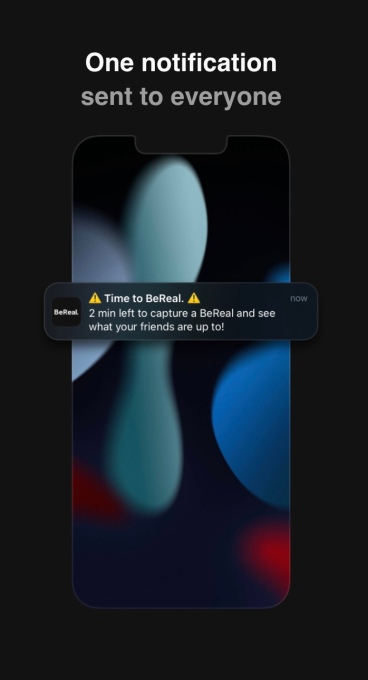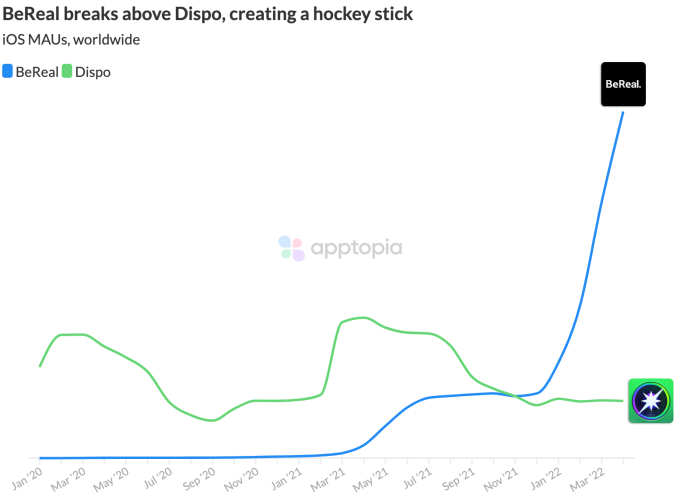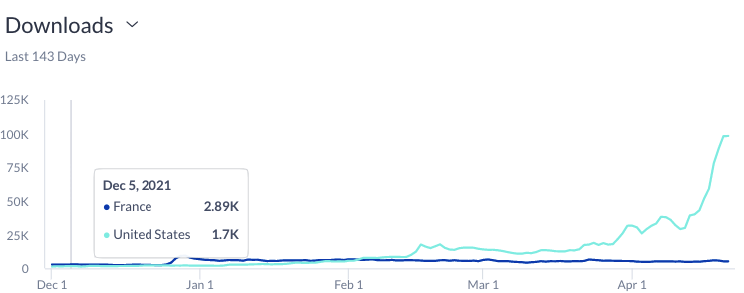An app called BeReal, co-founded by former GoPro employees Alexis Barreyat and Kévin Perreau, launched in December 2019 with the idea of asking users to post an unedited photo once a day after receiving a push notification. After being alerted, users have up to 2 minutes to share what they are doing and can see photos posted by their friends as well.
The app is easy to use and takes selfies and frontal photos at the same time – an experience that brings back fond memories of the long-lost photo app Frontback. (rest in peace).
The company explained that this experience offers users the opportunity to reveal who they really are.
The concept itself isn’t entirely new. In addition to Frontback’s use of dual cameras, a similar idea involving push notifications emerged a few years ago in a wave of apps trying to lure users from Instagram.

Image Source: It is true
Launched in 2017, an app called Minutiae helped pioneer the same concept BeReal is leveraging now: alerts that instruct users to catch whatever they’re doing right now. Minutiae co-founder Martin Adolfsson recently lamented to TechCrunch that it annoys him that BeReal has “heavyly borrowed” from his ideas while touting its authenticity.
Unfortunately, ideas are not patents. Over the years, we’ve seen many apps and products that offer a similar social experience, only one of which has really been a breakthrough success at the time. Look at Qik vs. Ustream.tv; Gowalla vs. Foursquare; Phhhoto vs. Boomerang; We Heart It vs. Pinterest; or, more recently, TikTok vs. others trying to clone it.
Also, while Minutiae will allow users to browse photos of strangers from around the world, BeReal is more directly aimed at real-life groups of friends.
There’s some demand for the new photo-sharing app from younger users who are tired of Instagram’s constant changes, cramming in new features like Reels and Shopping, and overly polished creator content. Other apps, like Minutiae and BeReal, have also experimented with unique photo-sharing experiences, trying to lure users away from Instagram with varying degrees of success.
Poparazzi — an app that turned Instagram’s hashtag feature into an entire premise — used a series of growth tricks to hype itself to the top of the App Store not long ago. Its popularity has since faded, and it now ranks 87th in the photo and video category of the US App Store.
Another app, Dispo, delayed the release of your digital snapshots to give itself a nostalgic feel, but it’s aimed at a generation who never knew what it was like to wait for a print. It also didn’t become the next new Instagram, now at #143 in the App Store for photos and videos.

Image Source: Utopia
Meanwhile, BeReal has been around for a few years. But app intelligence firm Apptopia noted earlier this month that 65% of its lifecycle downloads will occur in 2022, and its monthly active users have grown 315% year-to-date. Today, the company provided the latest data from TechCrunch. It found that BeReal had 7.67 million year-to-date downloads, or 74.5% of its lifetime installs. France (where the app is located) and the United States lead with 20.5% and 19.7% of install shares, respectively.
The company attributes the growth to word-of-mouth, BeReal’s college ambassador program, and a combination of new features like WidgetMoji, which puts your friends into a home screen widget, and RealMoji, which lets you react to conversations with stickers in iMessage . However, this level of rapid growth usually means marketing or advertising spend, not just organic adoption, which would be a slower growth and less dramatic jump.

Image Source: Utopia
BeReal will own the funds. The a16z and Accel-backed app raised $30 million in a Series A round last year. Looks like it does spend some money on usage.
It turns out that at least part of BeReal’s growth was made to make apps Look As if it were a viral hit. College students at Brown’s student paper report that BeReal pays them $30 per referral and $50 per referral to download apps with reviews. Students will receive the money via PayPal or Venmo, they said. Other student ambassadors organized events and handed out perks such as free boba to recruit new users, a report in Rice University’s student paper said.
According to BeReal’s website, the current ambassador program runs from January 2022 to June 2022. (BeReal declined to speak to TechCrunch, saying they were “not ready for the press just yet” [sic]. ”)
There’s nothing wrong with paying for user acquisition — that’s how the app ecosystem works, after all. Also, some paying users become engaged and loyal. That’s the goal!
So far, BeReal has been successful in this model: Apptopia says it has 2.93 million daily active users as of this writing.
It also received a 4.8 out of nearly 22,000 user reviews on the App Store and a 4.5 out of nearly 15,000 reviews on Google Play. It is currently the #4 app in the US App Store.
That said, it’s a little frustrating to see apps and 5-star reviews written about participating in purchase installs Clearly As the new favorite toy of Gen Z, the growth of the app is described in the article as organic growth. There is likely to be some word of mouth interest here, but that interest has been combined with good paid app installs.
In the early days of the App Store, this cash-to-download channel had more direct channels, until Apple cracked down on companies that “buy” its growth. But that just leads to more behind-the-scenes paid user acquisition work. Today, in addition to traditional channels — like online advertising/social ads, billboards, TV, etc. — we’re also seeing things like “viral” TikToks, which are actually undisclosed influencer marketing deals. Or, like BeReal, university ambassadors get paid for promoting the app to their target audience.
The latter might actually work if the hype puts the app in front of users who end up hooked on the experience and stick with it.
BeReal may have a big boost in user acquisition. And since its gimmick involves turning on push notifications, it can retain loyal users over time. But it’s a long way from proving it can become part of the daily rotation of users — we won’t know that until paid acquisition efforts slow down and apps fend for themselves in the playing field.
Still, we like BeReal’s download URL: bere.al/downloadthedamnthing.
Well, why not!










